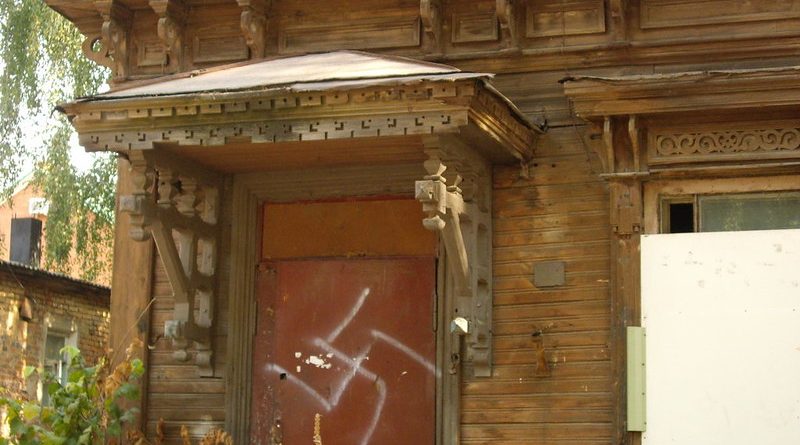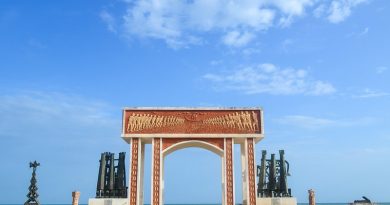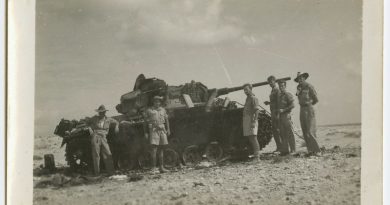Nazis and the Arab World
In the Arab world before and during World War 2, there was both support for the Nazi/Fascist camps in Europe, as well as opposition.
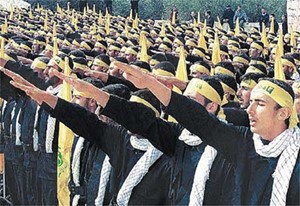 Arab involvement with the forces of Nazism/Fascism has been heavily politicised, both in the evolving debates over Israel/Palestine, as well as post 9/11 where the term ‘Islamofascism’ was introduced .This plays upon Orientalist assumptions of the inherent incompatibility between Islam and liberalism.
Arab involvement with the forces of Nazism/Fascism has been heavily politicised, both in the evolving debates over Israel/Palestine, as well as post 9/11 where the term ‘Islamofascism’ was introduced .This plays upon Orientalist assumptions of the inherent incompatibility between Islam and liberalism.
Whilst there was a base level of attraction felt amongst Arabs for the Italian/German models, it remains largely tied to an image of special relations between Adolf Hitler and the Grand Mufti of Jerusalem, Mohammed Amin al-Hussayni (1891-1974). Emphasised are the common themes of ‘revenge’ against the Allied forces, and stringent ‘anti-Semitism’ or hatred of the Jews.
More recently this was highlighted by Israeli Prime Minister Benjamin Netanyahu’s controversial statement that it was the Mufti who actually inspired the events of the Holocaust.
Certainly, fascism’s appeal to some segments of Egyptian , Iraqi and Palestinian society was real, particularly in light of the socioeconomic conditions of the period, characterised by broad-sweeping poverty and misery, and the anti-colonialism manifested by the Britain’s lingering presence since the end of World War 1.
Despite declaring Egypt’s independence in 1922, an imperial hover remained well into the 1950s. But Fascism ultimately failed to survive the politically ‘Fascist’ or ‘Nazi’ courtship of the Arab world.
The end of the Ottoman Empire and the abolition the Caliphate provided fertile ground for authoritarian and radical nationalist ideologies, but also for numerous pleas for alternative religious, political,social visions on the one hand and also a preference for more liberal style of government.There was also a view widely shared that there was an inherent incompatibility between Islam and democracy.
These forces were at play in Inter war Iraq where pro-Fascist, pro-Nazi inclinations were in evidence mainly because of the events and characters of 1941. This was the year of the Farhud: which involved an unprecedented attack on the Jewish community in Baghdad, the military coup d’etat by the nationalist group, the Golden Square, and the political installation of their leader, Rashid Ali al-Gayani. This was The holy trifecta in discourses championing Iraq’s anti-Semitic character and concocting its link with Nazi rule.
But the regime was toppled by the British And Iraq remained in the Allied camp for the rest of the war.
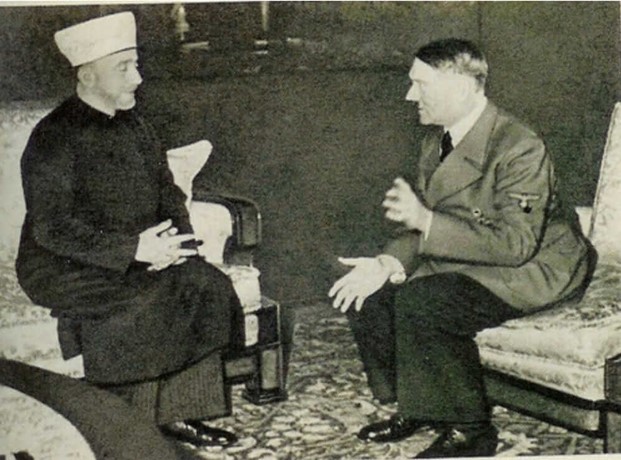
Similarly Fascist groups in Syria such as the Iron Shirts and the White Badge in Aleppo, with its paramilitary counterparts in Europe, tried to cement Nazi connections. The writings of Mustafa Talas, a Syrian military officer and the country’s Minister of Defence (1972-2004) seemed to condone Hitler’s treatment of the Jews ‘these blows gave us satisfaction and relief, because the Zionists and the historical enemy of the Arabs, and there was already someone who said that the enemy of my enemy is my friend’.
On the other hand, the memoirs of Syrian elite, Khalid al-‘Azm, published in 1973 communicate something of an ‘aversion’ toward the boundlessness of German ambition, remarking ‘the only thing Hitler sought was to strengthen Germany and turn it into a world power’. Here, suggestion of the Arabs and Nazis being spiritually connected by a set of ‘common goals’ is somewhat overturned. That years later, there remains no single view governing Vichy Syria’s relationship to Nazism, is surely indication that this has always been, and always will be, complicated.
Despite his overtures to the Arabs, Hitler felt they were inferior to the Aryan race.
Elsewhere in the Middle East , there were German overtures to the Shah of Iran but following Allied concerns that Iran could fall into the Axis camp, the decision was made to overthrow the Shah after the British Invasion of the country in 1941. The Shah was exiled to South Africa
In Algeria, where the French Vichy regime also held power in the early years of the war, tens of thousands of Jews were stripped of their citizenship and many placed in internment camps.
And in Lebanon’s snow capped mountain ranges, Allied alpine troops prepared in hidden mountain hideouts to do battle with Nazi alpine troops later in the war.

